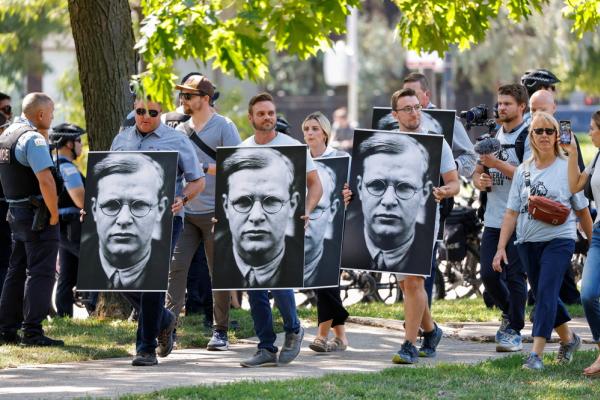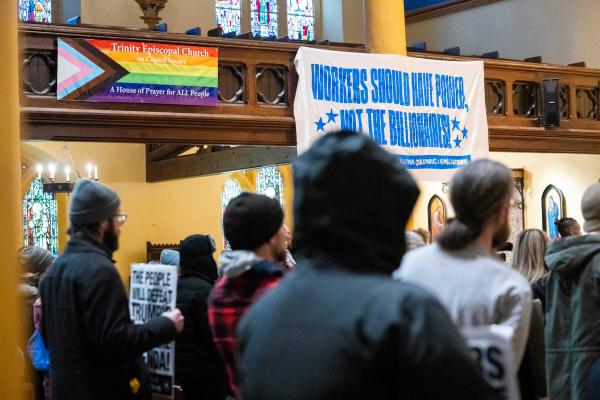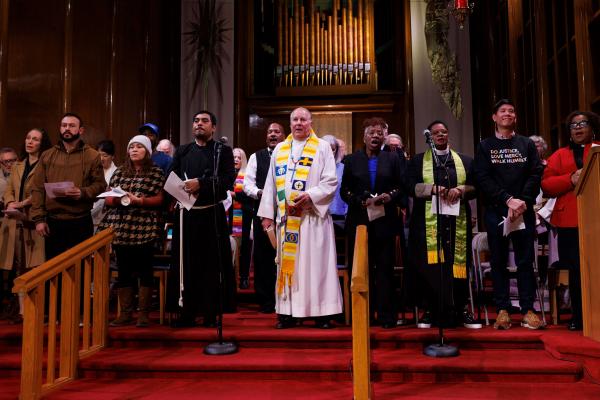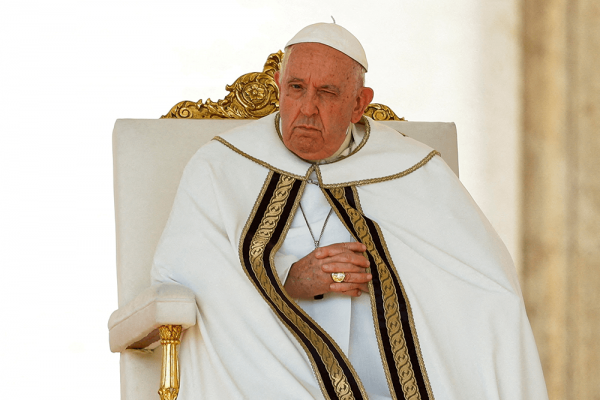A few months before he was arrested, Dietrich Bonhoeffer wrote an essay on Christian responsibility under authoritarianism. Reading it today is both eerily relevant and illuminating.
Similar to Parasite, Mickey 17 is ultimately about the ethics of revolutionary struggle. The film considers how Christian morality — especially as understood by thinkers like Friedrich Nietzsche, Michel Foucault, or Karl Marx, the latter of whom famously referred to religion as the “opiate” of the masses — prevents the downtrodden from standing up for their rights. Here, Pattinson’s Mickey is a clear stand-in for Christ and the model Christian. Resurrected ad infinitum, he humbly accepts the pain, suffering, and dehumanization inflicted on him by his apathetic, at times downright demonic coworkers as punishment for his perceived sins.
These first few weeks of President Donald Trump’s administration have already been grueling, with a blizzard of executive orders that run the gamut from trolling to hurtful to alarming. We all remember this feeling from the last time around — there are so many shiny objects of outrage for us to chase that after a little while it’s easy to just throw up our hands, admit defeat, and decide to wait out the maelstrom by streaming our favorite television series. So many people are hurt and scared; many are just exhausted.
During Trump’s inauguration in 2017, many responded by attending one of the hundreds of Women’s Marches around the country. Those who participated in these marches set the record for the largest single-day protest in United States history. During Trump’s inauguration this January, the protesters were sparse. It’s easy to feel isolated, alone, and hopeless. For us to get through Trump 2.0 together, we need to figure out new ways to organize.
Yanan Rahim Navarez Melo is a theologian getting his MDiv at Princeton Theological Serminary. He's also an artist pushing the boundaries of a burgeoning genre known as postclassical music. Here's how he sees these two areas of study overlapping.
Our Lord Jesus Christ could often be found on a mountain. He went to a mountain to pray, to seek solitude from the crowds. He fasted and prayed for 40 days and 40 nights on the mountain where the devil tempted him. He met Moses and Elijah on Mount Tabor and was transfigured before his disciples. His most famous sermon is the Sermon on the Mount.
As a homebirth midwife struggling with infertility, Abby Hall Luca intimately knows the gaps in fertility and maternity care. For 12 years she guided couples through the journey of growing their families while not being able to grow her own.
What does it look like for churches to act faithfully in the current tumultuous political crisis? Prophetic witness and speaking up for justice matters; acting faithfully goes hand in hand with speaking faithfully. Whatever policy priorities churches focus on, they should always look to go deeper into solidarity with those in need in their communities — especially marginalized people who are in danger due to unjust government actions.
Solidarity isn’t affection. Solidarity is, instead, a recognition that our destinies are intertwined because of our common humanity. As Martin Luther King, Jr. wrote in his 1963 “Letter from Birmingham Jail,” “We are caught in an inescapable network of mutuality, tied in a single garment of destiny.”
Prepare hearts for Easter this Lenten season with Heifer International's Fill the Ark program. This meaningful family devotional fosters gratitude through a four-week giving calendar, helping families reflect on their blessings and extend generosity.
At the first of what will be many funerals that appear in The Monkey, a young priest struggles to find the right words. After offering some half-hearted bromides about how everything happens for a reason, the priest can no longer pretend that there’s some divine plan behind the death that brought them together — an accident involving a hibachi chef’s knife getting too close to a diner.
“It is what it is,” the priest (Nicco Del Rio) finally declares, with the most conviction he can muster. “The words of the Lord.”
Before he was hospitalized for double pneumonia, Pope Francis was battling firm resistance from some of his own cardinals about how to plug a widening gap in the Vatican’s finances.









